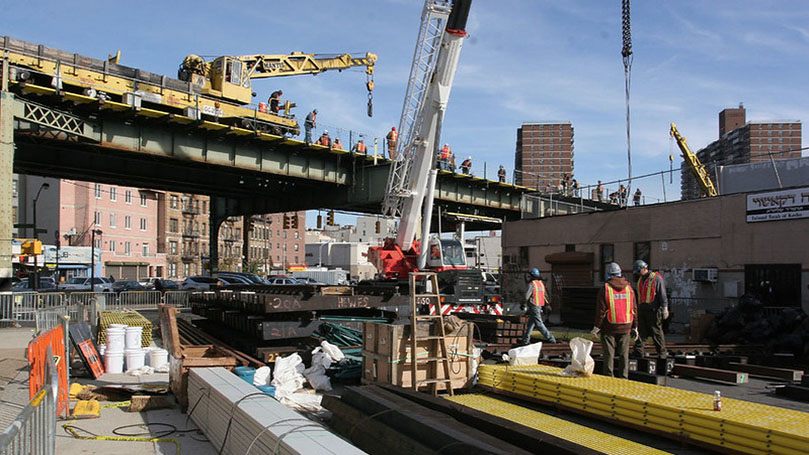
The Republican counter proposal to Biden’s $1.7 trillion dollar infrastructure plan threw a wrench into the previous Democratic plan to vote most of the plan through the Senate using a simple majority vote, made possible under complicated Senate “reconciliation” rules. Even under such rules, the vacillations of West Virginia Senator Joe Manchin make the reconciliation path uncertain.
The Republican effort is intended to derail all the “social infrastructure” components, as well as any policy that would consider health, education, R&D, or environmental deficits as infrastructure.
Now the plan has collapsed. Biden has dropped it for falling far short in both funding and scale. Further, Manchin has claimed he will oppose filibuster reform. If he holds to that position, a two-thirds’ majority vote in the Senate will be required for anything Republicans do not like. This will effectively kill any chance of near-time passage of the PRO Act, any “social” infrastructure, serious climate action, or voter suppression and discrimination reforms.
The other Republican motivation is the usual: they do not want to pay taxes. They demand to keep the Trump tax cuts — a billionaire heist of public wealth —and to redirect money from the American Rescue Plan Act intended for unemployment and state pandemic costs to fund bridges and roads.
We are at a critical passage in the recovery. The logjam is structural, meaning it is unlikely to be resolved unless mass pressure overwhelms the obstacles.
There is much — indeed life and death for this nation and its peoples — at stake in this social infrastructure investment, which in essence is just one more, but this time qualitative, injection of more socialism into the U.S. economy.
Ironically, it delivers a serious blow to Biden’s “bi-partisan” ambition to out-compete China in economic and technological development. All this is in service to protecting the prerogatives and returns to the rich. China’s capacity to focus economic and technical resources, however, for better or worse, and with obviously much broader national unity than exists in the U.S., is increasing the need for such “social infrastructure” spending.
“Sustainability” is a modern, and more comprehensive term for what Karl Marx called “reproduction.” Marx’s use of the term was narrower but perhaps more relevant in the context of “infrastructure.” From an economic point of view, “social infrastructure” is largely the investments we make in the reproduction of our society, one generation’s obligations to the previous, current, and next — our children. This is especially true of the reproduction of “human capital” — the skills, health, talents, and cultural requirements of our peoples. Education, training and retraining, health care, child development, talent enrichment, diversity, culture — such “capital” must be sufficient to sustain the societies’ wealth and achievable standards of living with available divisions/collaborations of such “human capital.” Material production, agricultural technology, and ever more enriched services are the foundations of both liberation from less than fully humanizing labor and the advance of civilization. The Chinese are teaching: You get there faster when you have a plan!
Granted, funding bridges and roads is a step forward from the Pit of the Plague Year. They are in serious need of repair, not to mention new infrastructures needed for electric vehicles, which, for example, will impact tax structures and revenues for road work in every state.
Unemployment still stands at over 6%, the pandemic outcome is hardly yet certain, and workforce participation is still at the lowest levels in a century. The wounds are still very deep, and not just from the pandemic-induced depression. Trump’s racist, fascist regime inflicted devastating social and institutional damage.
But if Biden loses the “social infrastructure” fight, the most that can be won will be a return to the “normal” of January 2020, which is a powerful nation flirting with doom on numerous fronts. With the still unfolding pandemic, even that is highly uncertain. Any deal that postpones social infrastructure, labor empowerment, voter reform, and aggressive carbon-reduction investments will set the nation even further behind, which, along with a cold war nationalistic posture, is an invitation to the Trumpers to return.
It is a good thing that such a deal, watered-down as it is, fails. However, what is the consequence? Lacking any evidence that markets will lead us to some equilibrium, and presented with pervasive paralysis in legislation and reactionary Republican judges, a national security crisis is inevitable if the expected “externalities” and inequitable consequences keep on coming.
The increasing likelihood of national security crises, internally, if the necessary recovery packages are not passed, adds a dangerous twist to the cold war stance of Secretary of State Blinkin. If conflict with China is used as cover for internal security measures required to break the logjam, the “national security” crisis will deepen, not lighten.
A more favorable analysis, to Biden, relies more on his reputation for honesty, and honest feeling, and political skill. Any decision he makes is fraught with risk. That’s the president’s job. If he is playing the Right on national security to get the jobs and infrastructure, including social infrastructure, he will have to play the Left to keep it from getting taken over by the dead ends of another cold war. A favorable view holds that Biden knows he must get the infrastructure, all of it. And he must keep the peace.
How can one not wish him Godspeed in such a mission, despite its risks. However, the course and bad karma of U.S. capitalism’s arc of global dominion may yet confound the most heroic effort at reform; upheavals and the return of Lincolns or Lenins be required. In such a scenario, our best hope may be one of a peaceful, global relative diminution of the power of nationalisms worldwide. Such stances would be in better alignment with objective reality, which is submitting powerful arguments, daily, for greater global cooperation over, or at least alongside, competition.
The opinions of the author do not necessarily reflect the positions of the CPUSA.
Image: New York Metropolitan Transportation Authority (CC BY 2.0).


 Join Now
Join Now